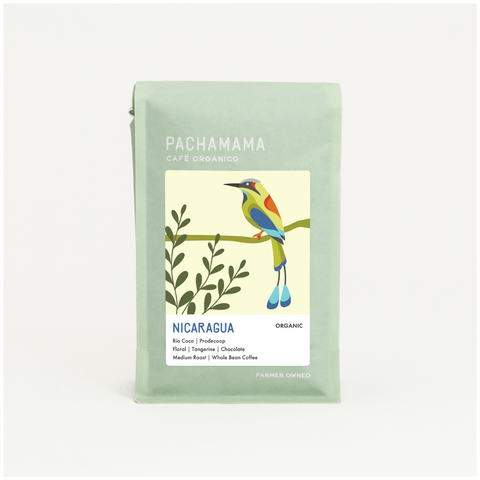Clean water protections, biodiversity preservation and carbon sequestering.
This isn’t the typical thing your mind goes to when you think about coffee. But in the hills of Huatusco Mexico, the Andes of Peru, the volcanic mountains in Guatemala, forests of Nicaragua and Ethiopia that’s what Pachamama Coffee’s farmer owners are achieving in their dedication to shade grown and organic farming.
This isn’t to say all coffee farming is made the same. Like many other crops, coffee, especially industrial farms, can lead to the degradation of the land, water sources, forests and loss of biodiversity. When Pachamama was founded by revolutionary coffee farmers around the world, they not only sought a better price for their coffee but a way of ensuring their land was productive and healthy for generations to come. 
Organic and shade grown farming is different. Instead of clear cutting forests to plant crops, farmers work with the shade canopy to foster a symbiotic relationship with nature to grow and cultivate coffee and many other plants to feed their families and diversify their incomes.


By preserving natural ecosystems and shade canopy forests, farmers are growing a better crop of coffee AND the techniques they use draw carbon, the biggest climate change contributor, back to the soil and out of the atmosphere. In recent decades this type of farming has come to be renowned as regenerative agriculture, but our farmers have been practicing this for generations through native cultivation and indigenous land practices. For our farmer owners, it isn't about following the trends and new movements in agriculture but a continuous commitment to the land and our planet for a better future for the generations after us.
In a recent article by Conservation International, they highlighted one of the many ways that small holder farmers in Peru are utilizing the same techniques our farmer owners are using to stop the spread of deforestation, rebuild Peruvian ecosystems and create bird-friendly (and biodiversity preserving) coffee.
“As the canopy returns to places that were once deforested, so does the wildlife. And by farming in a way that maintains the plants, trees and fungal networks of this ecosystem, coffee growers are fueling a natural engine for storing climate-warming carbon.” 


Non-organic agriculture requires chemical pesticides and fertilizers that actively disrupt the many natural systems. It can harm plants, animals and water sources that are not intended to be the target but are in fact impacted deeply. These chemicals can run off into streams and infect the clean drinking water for the animals in surrounding areas, as well as the access for families and the rest of the community. In addition, pesticides are shown to decrease bee populations that are crucial to the pollination and production of coffee cherries.
Coffee farmer and Pachamama Owner at La Union Regional in Huatusco, Mexico, Joel Carlos Fernandez shared
 “I don’t want myself or my family to get sick by harmful chemicals, It not only hurts ourselves, but the land that produces what we consume, the animals we share the space with, the water we drink.”
“I don’t want myself or my family to get sick by harmful chemicals, It not only hurts ourselves, but the land that produces what we consume, the animals we share the space with, the water we drink.”
As climate change begins to alter the expected rainfall patterns, heat waves, frost and more that coffee farmers are experiencing, shade grown production is a way for farmers to weather proof their fields.
 In research done analyzing shade grown production and producer livelihoods, Dr. Johanna Jacobi, Assistant Professor at the Swiss Federal Institute of Technology (ETH) Zurich stated “ shade-grown agroforestry approaches for growing coffee will become even more important with the ongoing climate crisis”…. as “more extensive dry spells are expected. Then, keeping moisture in the soil will be critical.”
In research done analyzing shade grown production and producer livelihoods, Dr. Johanna Jacobi, Assistant Professor at the Swiss Federal Institute of Technology (ETH) Zurich stated “ shade-grown agroforestry approaches for growing coffee will become even more important with the ongoing climate crisis”…. as “more extensive dry spells are expected. Then, keeping moisture in the soil will be critical.”
All this to say the list can go on and on over the benefits of growing organic and shade grown coffee; to produce a better cup of coffee for you and a better more sustainable future for coffee farmers and for the planet.
You’ll notice on almost every label of Pachamama Coffee there is an animal depicted in the art. These were chosen and designed in part with our farmer owners to highlight the unique biodiversity of their region that we are striving to keep safe and thriving for generations to come through intentional coffee growing.





As a consumer you have a choice when you go to the grocery store or a coffee shop to choose something better for your own health and better for all of those involved throughout the supply chain. Our hope is to bring light to better ways of doing business by buying your products with the planet and people in mind. Next time you enjoy a cup of Pachamama Coffee you can sip slowly with the knowledge that your choice has a beneficial lasting impact.
